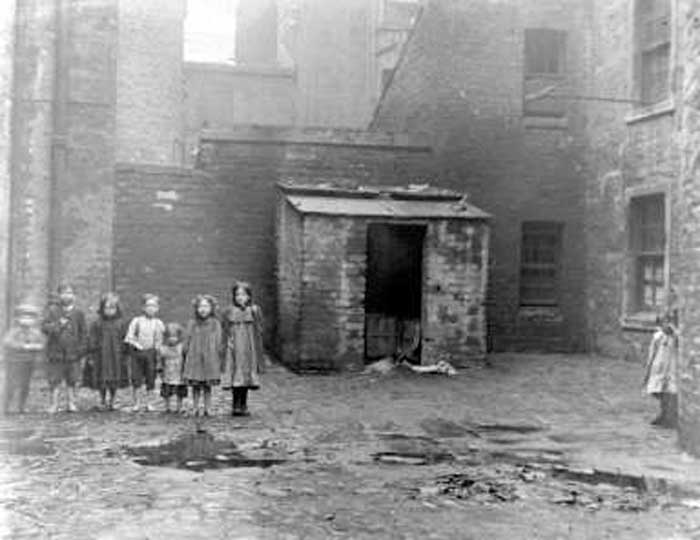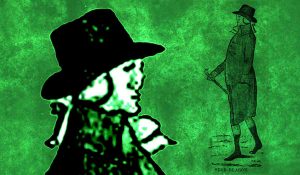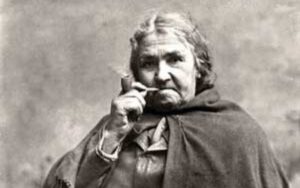Bubonic Plague terrorised Glasgow as late as 1900. MJ STEEL COLLINS reveals how the Scottish city coped with the medieval disaster…

Despite the 1867 Public Health Act, Glasgow in 1900 was still a haven for various nasty diseases thanks to its slum housing.
It was common for people to fall ill and in many cases die of ‘fever’.
But August of that year saw a new kind of ‘fever’ in the Gorbals that had the city medical experts scratching their heads in confusion.
It began in Rose St when the wife and granddaughter of Hugh Bogie, a docker, died from what was initially believed to gastroenteritis and zymotic enteritis.
Soon, other people in the neighbourhood began contracting and dying from a serious illness.
As in the first case, various different causes were given, but the medical fraternity had a feeling something was wrong.
Finally, in late August, a doctor at Belvedere Infectious Diseases Hospital diagnosed the Bubonic Plague.
The Sanitary Authorities were quick to act – they looked for anyone who might have had the slightest contact with the Bogie family and at the same time managed to track the spread of the Plague.
It was believed that the disease had been brought into Glasgow, then a major port, by an infected rat on board a ship.
In the last decade, there had been outbreaks of the Plague in Asia, which had spread.
As Mr Bogie was a docker, a line of thought was that he had carried it home, but it turned out he only worked on ships that sailed the British Coast.
Another potential source was from the late Mrs Bogie’s work as a fish hawker, but this too was inconclusive.
It was discovered that some of the later victims of the outbreak had been to the wakes held for Mrs Bogie and her granddaughter.
Wakes for the dead were rather popular, particularly in the Gorbals.
They would begin solemnly, respects being paid to the recently deceased lying in an open coffin in the main (sometimes the only) room of the house.
A drink customarily handed out to visitors and wakes often had total strangers turn up solely for the alcoholic refreshment.
As a wake wore on, a party atmosphere would descend, people singing and enjoying themselves, whilst children played among them. Over 100 people attended Mrs Bogie’s wake, and from thence, the Plague spread.
The Sanitary Authorities quickly enforced a ban on wakes.
This and the trapping of 6000 rats, which carry the Plague fleas, led to the containment of the outbreak.
Rats and plague deaths in Glasgow
Overall, there were 48 cases and 16 deaths.
One legacy of the outbreak was Glasgow becoming a Port Health Authority, increasing sanitary inspections of ships coming into the city.
Although ships from Asia were de-ratted, and some placed in quarantine, things were relatively lax in sanitary inspections of ships.
However, it’s still not known exactly what the source of the outbreak was and anything put forward is mere supposition.
Another, unpleasant legacy of the outbreak stems from the prejudices of the time.
The ban on wakes, an Irish tradition, and the belief that the outbreak originated from an infected rat being brought into Glasgow on a ship from overseas, fed into the negativity held towards Irish immigrants and Lascar sailors.
The result was the commonsense explanation that these groups spread the Plague.
It was the norm to blame the lower classes for any deadly disease that hit society because of their ‘unclean ways’.
However, the tide is beginning to turn, with some historians starting to look at the actions of those up the social scale in such outbreaks of deadly disease…
Tell us your thoughts on this article in the comments section below!







So interesting.excellent peice nowith a know a bit more of our city.
Thanks, Gerry, it’s definitely something that not a lot of people know!
My Great Grandpa, Dr Tom Colvin was the GP in Crown Street who treated patients of the Bubonic Plague in the Gorbals, detailing the symptoms, environments and treatment. It’s quoted in The Lancet that “Glasgow may probably owe [him] a debt of untold greatness”…